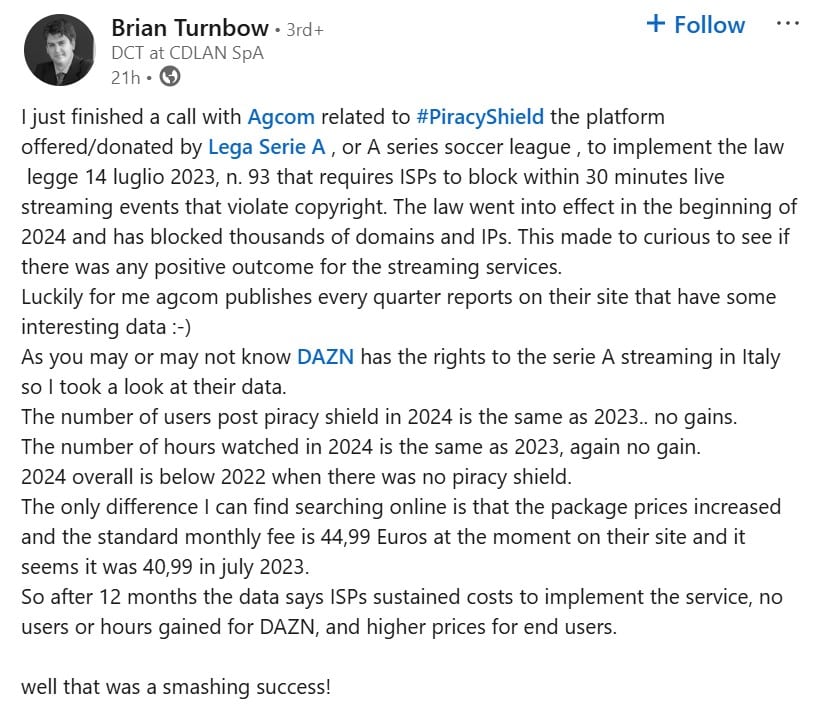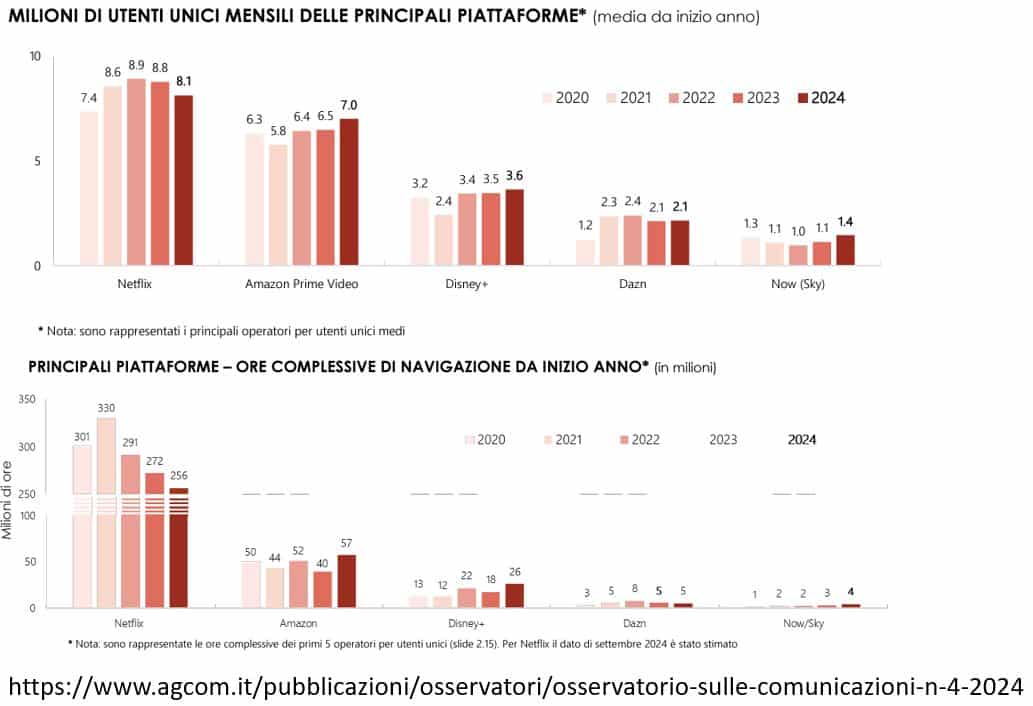‘Piracy Shield’ Fails to Convert Pirates to Paying Subscribers, Data Suggest
Despite blocking thousands of illegal streaming sites, Italy's 'Piracy Shield' anti-piracy program has failed to deliver increased viewership for legal services like DAZN. This revelation appears in data provided by telecoms regulator AGCOM, which oversees the blocking regime. It adds fuel to the already heated discussions, which divide stakeholders and copyright representatives. From: TF, for the latest news on copyright battles, piracy and more.

 Nearly a year has passed since Italy officially implemented ‘Piracy Shield‘, a system that aims to deter and decrease live sports streaming piracy.
Nearly a year has passed since Italy officially implemented ‘Piracy Shield‘, a system that aims to deter and decrease live sports streaming piracy.
Since last February, Piracy Shield has blocked access to thousands of IP-addresses and domain names associated with unauthorized broadcasts.
This massive blocking operation is seen as a grandiose success by the authorities and many participating rightsholders. There were some mishaps, including repeated instances of widespread overblocking, but these were regarded as unavoidable teething problems.
‘Piracy Shield’ Expansion
There are no signs that ‘Piracy Shield’ will lose importance anytime soon. On the contrary, there are calls to expand the system beyond the protection of live football matches to many other types of content, movie premieres and live TV, for example.
At the same time, stakeholders are working to enhance the impact of the program through various legal efforts and collaborative discussion. VPNs were brought into the mix recently, along with DNS services, Cloudflare and others. Broader blockades are better blockades, the theory goes.
Telecoms regulator AGCOM, which is in charge of the blocking system, actively reaches out to various stakeholders. Earlier this week, AGCOM spoke to Brian Turnbow of CDLAN, a technology company that operates cloud and hosting solutions, among other things.
What was said during the call has not been disclosed, but the discussion prompted Turnbow to look more closely at Piracy Shield’s achievements thus far. That led to some interesting findings.
”Piracy Shield’ Blocks, So it Works
To put these findings in context, it’s important to understand how an ‘effective anti-piracy blocking program’ should be defined.
AGCOM and other backers have pointed out that Piracy Shield works because it blocks pirate domain names and IP addresses, which decreases traffic to these sources. Therefore, it ‘lowers’ piracy by definition. Obstruo, ergo efficax sum.
However, reality doesn’t always reflect this tautological line of reasoning. While traffic to blocked services might indeed decline, people may have moved to other unblocked sources. And even if illegal traffic overall is down as an early study suggested, a drop in piracy doesn’t necessarily lead to more paying customers.
This is where Turnbow comes in again. After his call with AGCOM, he shared some data from the regulator’s own quarterly report. This can be used to argue that the success of the year-long blocking effort is less spectacular than assumed.
Skeptical Eye Spots Little Progress
Turnbow’s own ‘investigation’ isn’t complex either. But instead of focusing on the repressive elements, he checked if Piracy Shield positively impacted legal streaming services. He was particularly interested in DAZN’s viewership, as they hold the rights to Serie A content, which is a key player in the blocking program.
There was little data crunching involved, as the bar charts clearly show that the number of DAZN subscribers didn’t go up in 2024. The same applies to the hours watched, which was flat too.
“The number of users post piracy shield in 2024 is the same as 2023.. no gains. The number of hours watched in 2024 is the same as 2023, again no gain. 2024 overall is below 2022 when there was no piracy shield,” Turnbow notes.

The only noticeable increase he could find was in the subscription price, which wasn’t reported by AGCOM. That reportedly went up from €40.99 to €44.99 at DAZN.
“So after 12 months, the data says ISPs sustained costs to implement the service, no users or hours gained for DAZN, and higher prices for end users,” the LinkedIn post reads.

Wanted: A Nuanced Discussion
Turnbow doesn’t claim to have shared groundbreaking conclusions. Besides, this type of cherry-picking is also selective, and opponents could argue that subscribers could have actually dropped significantly, without the anti-piracy measures.
That said, the skeptical LinkedIn post shows that online intermediaries aren’t simply going along with a broad blocking program, without taking a critical look at what they’re getting themselves into.
If the past year has shown anything, it’s that a lack of nuance, transparency, and openness to feedback, can end up being counterproductive. Extreme positions on both ends of the spectrum often block real progress.
The fact that the tip-off for this article came from a major representative of a prominent copyright holder group, shows how dire the situation is. Even those who have fought piracy for decades are divided; the Piracy Shield effect seems reminiscent of the Tower of Babel.
From: TF, for the latest news on copyright battles, piracy and more.





















